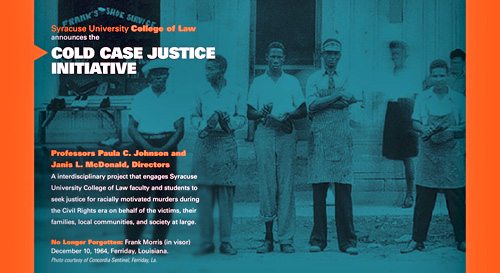
In doing my work on racial violence in Southwest Mississippi in the 1950s and 1960s, it is exciting to get to know some of the other people doing similar work.
Syracuse University College of Law Professors Janice McDonald and Paula C. Johnson direct the Cold Case Justice Initiative, which has been playing a role in the investigation of the December 10, 1964 murder of Frank Morris in Ferriday, La.
To get to Ferriday from Natchez, MS, you just take US-84 west over the Mississippi River approximately 11 miles. The Klan faction linked to a great deal of the violence in Natchez and other towns in that part of Mississippi frequently met in Ferriday.
I've therefore been having some interesting conversations with Professor McDonald, who sent me the promotional postcard for the CCJI. The front of the postcard, displayed above, says that the CCJI is:
A interdisciplinary project that engages Syracuse University College of Law faculty and students to seek justice for racially motivated murders during the Civil Rights era on behalf of the victims, their families, local communities, and society at large.
No Longer Forgotten: Frank Morris (in visor) December 10, 1964, Ferriday, Louisiana. Photo courtesy of Concordia Sentinel, Ferriday, La.
The Cold Case Justice Initiative (CCJI) was founded in response to the 1964 Ferriday, La. murder of shoe shop owner Frank Morris, which remains unsolved. Forty-four years ago, two suspected Klan members forced Mr. Morris into his shoe repair shop at gunpoint and set the store on fire. Morris died four days later of his severe burns.
The back of the postcard (not pictured here) elaborates:
Law students, under the supervision of Professors Paula C. Johnson and Janis L. McDonald, researched thousands of documents and worked with local investigative reporters which led to witnesses providing new information, to the appointment of a special agent by the FBI, and to a pledge by the U.S. attorney for a full review of the case. The students efforts ignited law enforcement investigation of additional deaths long suspected by the community to be racially motivated and committed by the Klan. Professors Johnson and McDonald developed the course, “Investigating and Reopening Unsolved Civil Rights Era Murders,” first offered during the 2007-2008 academic year. This interdisciplinary course introduces students to civil rights history, civil rights law, criminal procedure, evidence, advocacy skills, and global human rights in the context of investigating specifically assigned civil rights era murder cases in the Southeastern U.S. Overall, the course emphasizes this work as part of the social and professional responsibility of lawyers, legal educators, and law students. This ongoing project will insist on vigilant attention to these long unresolved racially motivated killings and continuing issues of racial justice. For more information visit http://coldcaselaw.syr.edu
You can learn a great deal more about the Frank Morris case and the history of Ferriday, La. in the amazing Concorida Sentinel articles of Stanley Nelson.







